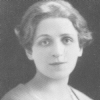Laura Riding

Laura Riding
LauraJacksonwas an American poet, critic, novelist, essayist and short story writer...
NationalityAmerican
ProfessionPoet
Date of Birth16 January 1901
CountryUnited States of America
truth bells rings
Truth rings no bells.
truth taste firsts
we shall know that we have begun to speak true by an increased hunger for true-speaking; we shall have the whole hunger only after we have given ourselves the first taste of it.
women people way
Women, ever since there have been women, have had a way of being people.
men two entering
Woman has two works to perform: a work of differentiation, of man from herself, and a work of unification, of man with herself. ... We, woman, are now entering upon our second work.
country men stranger
Women are strangers in the country of man ...
stories telling-the-truth function
My function as a writer is not story-telling but truth-telling: to make things plain.
curious happenings unimportant
... whatever is not happening now is unimportant; it is merely curious.
waiting stories strange
We wait, all, for a story of us that shall reach to where we are. We listen for our own speaking; and we hear much that seems our speaking, yet makes us strange to ourselves.
essence psychics political
The sciences that purport to treat of human things -- the new scientific storyings of the social, the political, the racial or ethnic, and the psychic, nature of human beings -- treat not of human things but mere things, things that make up the physical, or circumstantial, content of human life but are not of the stuff of humanity, have not the human essence in them.
philosophy reality giving
How our story has been divided up among the truth-telling professions! Religion, philosophy, history, poetry, compete with each other for our ears; and science competes with all together. And for each we have a different set of ears. But, though we hear much, what we are told is as nothing: none of it gives us ourselves, rather each story-kind steals us to make its reality of us.
memories giving mind
The end of poetry is not to create a physical condition which shall give pleasure to the mind... The end of poetry is not an after-effect, not a pleasurable memory of itself, but an immediate, constant and even unpleasant insistence upon itself.
communication self understanding
Women from earliest times have been used as conveniences of communication with unseen, inaccessible powers, but always in the sense that such exposing of self to dangerous mysteries, such destruction of the understanding as was required to become the slave of unseen powers, did not matter because the communicant was only a woman, in herself an undetermined cipher - a nothing.
long giving may
Much of the magical effect that poetry gives of rendering everything it touches pellucid comes from the necessity of compression that it imposes. The impossibility of pausing in poetry as long as may be needed to make sense clear causes many a set of words actually deficient in linguistic workmanship to pass for an eloquent brevity.
art inspiration men
Emile Saint-Blague had been a lively, versatile painter in his youth, but he had abused his energy by painting too many pictures; so that in what might have been the ripe period of his art he had nothing left but ideas. A man who has nothing left but ideas may be of great service to his friends, but he is of no use at all to himself. Emile was certainly an inspiration to his friends.